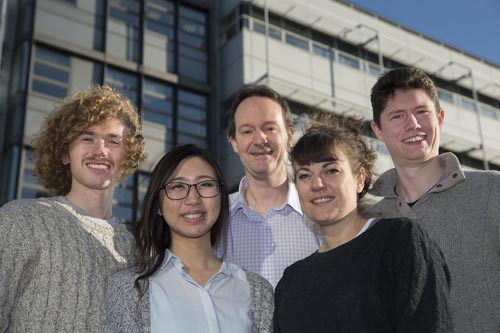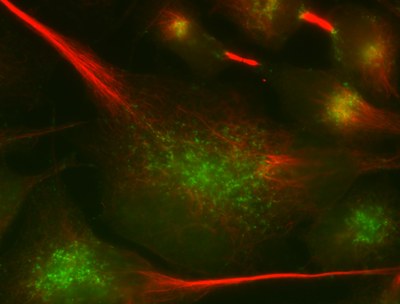Connell JW, Allison RJ, Rodger C, Pearson G, Zlamalova E, Reid E (2019) ESCRT-III-associated proteins and spastin inhibit protrudin-dependent polarised membrane traffic. Cellular and Molecular Life Sciences, in press.
Shribman S, Reid E, Crosby AH, Houlden H, Warner TT (2019). Hereditary spastic paraplegia: from diagnosis to emerging therapeutic approaches. Lancet Neurology, S1474-4422(19)30235-2
Newton T, Allison R, Edgar JR, Lumb JH, Rodger CE, Manna PT, Rizo T, Kohl Z, Nygren AOH, Arning L, Schüle R, Depienne C, Goldberg L, Frahm C, Stevanin G, Durr A, Schöls L, Winner B, Beetz C & Reid E. Mechanistic basis of an epistatic interaction reducing age at onset in hereditary spastic paraplegia. Brain 141, 1286-1299 (2018).
Allison R, Edgar JR, Pearson G, Rizo T, Newton T, Günther S, Berner F, Hague J, Connell JW, Winkler J, Lippincot-Schwartz J, Beetz C, Winner B & Reid E. Defects in ER-endosome contacts impact lysosome function in hereditary spastic paraplegia. J. Cell Biol. 216, 1337-1355. PMCID: PMC5412567 (2017).
Highlighted as Science Editors’ choice: Science (2017) 356, 498. Recommended by Faculty of 1000. Selected for JCB “Special Collection of Outstanding Articles on Lysosomes and Endocytosis” (2018).
Allison R, Lumb JH, Fassier C, Connell JW, Ten Martin D, Seaman MNJ, Hazan J, Reid E. An ESCRT-spastin interaction promotes fission of recycling tubules from the endosome. J. Cell Biol. 202, 527-543 PMCID:PMC3734076 (2013).
Montenegro G, Rebelo AP, Connell J, Allison R, Babalini C, D'Aloia M, Montieri P, Schüle R, Ishiura H, Price J, Strickland A, Gonzalez MA, Baumbach-Reardon L, Deconinck T, Huang J, Bernardi G, Vance JM, Rogers MT, Tsuji S, De Jonghe P, Pericak-Vance MA, Schöls L, Orlacchio A, Reid E & Züchner S. Mutations in the ER-shaping protein reticulon 2 cause the axon-degenerative disorder hereditary spastic paraplegia type 12. J. Clin. Invest. 122, 538-544 PMCID: PMC3266795 (2012).
Tsang HTH, Edwards TL, Wang X, Connell JW, Davies RJ, Durrington HJ, O’Kane CJ, Luzio JP & Reid E. The hereditary spastic paraplegia proteins NIPA1, spastin and spartin are inhibitors of mammalian BMP signaling. Hum. Mol. Genet. 18, 3805-3821 (2009).
Connell JW, Lindon C, Luzio JP & Reid E. Spastin couples microtubule severing to membrane traffic in completion of cytokinesis and secretion. Traffic 10, 42-56 PMCID:PMC2709849 (2009).
Wang X, Shaw RW, Tsang HT, Reid E, O’Kane CJ. Spichthyin, the Drosophila homolog of ichthyin and SPG6, is an inhibitor of BMP signaling, and can impair axonal transport. Nature Neurosci. 10, 177-185 (2007).
Sanderson CM, Connell JW, Edwards TL, Bright NA, Duley S, Thompson A, Luzio JP & Reid E. Spastin and atlastin, two proteins mutated in autosomal-dominant hereditary spastic paraplegia, are binding partners. Hum. Mol. Genet. 15, 307-318 (2006).
Reid E, Connell J, Edwards TL, Duley S, Brown SE & Sanderson CM. The hereditary spastic paraplegia protein spastin interacts with the ESCRT-III complex-associated endosomal protein CHMP1B. Hum. Mol. Genet. 14, 19-38 (2005).
Reid E, Kloos M, Ashley-Koch A, Hughes L, Bevan S, Svenson IK, Lennon Graham F, Gaskell PC, Dearlove A, Pericak-Vance M, Rubinsztein DC & Marchuk DA. A kinesin heavy chain (KIF5A) mutation in hereditary spastic paraplegia (SPG10). Am. J. Hum. Genet. 71, 1189-1194 (2002).




